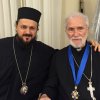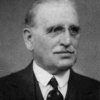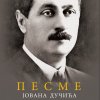Father Dusan Bunjevic Honored
by Dawnell Vuko Lewis
To commemorate the fiftieth anniversary of his ordination into the priesthood, Father Dusan Bunjevic was honored at a luncheon on February 8, 2015, at St. Archangel Michael Serbian Orthodox Church in Saratoga, California.
Father Bunjevic served St. John the Baptist Cathedral in San Francisco from 1964 until his retirement in 1999, but to ensure ample space to the sold-out event, the luncheon was held at nearby St. Archangel Michael's.
The celebratory crowd included the Bunjevic family, many of father's parishioners, people from the several parishes of the San Francisco Bay Area, and especially a group from Indiana where Father Bunjevic had begun his long service to the church at Gary's St. Sava in 1960 and where he was ordained in 1964.
A hierarchal liturgy started the day with Bishop Maxim of the Western Diocese and all of the priests of the San Francisco Bay Area in attendance for this wonderful occasion. The parishioners from St. Archangel Michael - members of both the church and the Circle of Serbian Sisters, or Kolo - set the hall and provided a spectacular lunch to rival any 5-Star restaurant.
After the church services, appetizers were served during the social hour. The emcee of the event was Bill Davidovich.
After lunch Father Bunjevic was given many tokens of appreciation, including icons and a plaque thanking him for his service. Bishop Maxim, the local parishes, and the St. Sophia Sisterhood of San Francisco provided the beautiful icons. The First Serbian Benevolent Society gave him a plaque commemorating his 50 years of service to the Serbian community.
Bill Davidovich, with the help of Father Bunjevic's son Pavle, delivered an inspiring and informative speech. Father Bunjevic himself gave the final speech on the program and, in a most touching moment, thanked his wife, Protinica Ljiljana, for helping him on this 50-year Journey.
Even those who have known him well gained a deeper insight and appreciation of his service to the Church and the Serbian people after hearing the details of Father's life highlighted in the program.
Father Dusan was born in Sarajevo, Yugoslavia, on April 25, 1928. He was the only son of Pavle and Zora (nee Tomic) Bunjevic.
His father was a civil engineer, and young Dusan spent most of his youth growing up in Nis, Belgrade, Dubrovnik, and Mostar. For his beliefs, not popular with the Yugoslav regime, he spent four years in jail. Afterwards he graduated from secondary school, the VI Belgrade Gymnasium. in 1951.
From 1951 to 1954, Dusan Bunjevic studied Theology and Philosophy at the University of Belgrade. After finishing, he defected to Greece as a political refugee. There he received a two-year scholarship to Saint Serge Theological Seminary in Paris.
In 1956, with a Certificate of Divinity in hand, he landed in Chicago. Two years later, on February 2nd, he married the beautiful, kind, generous, and multitalented Ljiljana Selakovic.
His first assignment came four years later, in 1960, at St. Sava Serbian Orthodox Church in Gary, Indiana. He was appointed Superintendent of the Sunday School and the Serbian School of the parish. That same year Dusan Bunjevic's mother, "Mama Zora," came to live with him and his family and remained with them until her death in 1994.
In Jackson, California, on July 4, 1964, Dusan Bunjevic was ordained a deacon. On August 9, 1964, Deacon Dusan Bunjevic was ordained a priest at St. Sava's in Gary. The next month, on September 4, 1964, Bishop Irinej appointed him parish priest of St. John the Baptist Serbian Orthodox Church in San Francisco.
In 1961, Father was elevated to the rank ofVery Reverend and, in 1978, to Vicar General of the Westem Region of the New Gracanica Metropolitanate. In 1994, Father Bunjevic was raised to the rank of Stavrofor, the highest rank in the Serbian Orthodox Church for a married priest. Upon reconciliation of the Serbian Orthodox Church, he was appointed Vicar General for the San Francisco Deanery of the Western American Diocese.
After 35 years of dedicated service, Father Dusan retired from St. John the Baptist Church in November of 1999. But his religious duties did not end.
Even though he probably looked forward to retirement, shortly thereafter, Father Dusan was appointed administrator of St. George Serbian Orthodox Church in Oakland, Califomia.
Since his arrival in California fifty years ago - and to this day - Father Dusan Bunjevic has been instrumental in the administration of the St. Sava Serbian Orthodox Church Camp in Jackson, California. Under his leadership, the campers have made life-long friendships, and many married couples first met at summer camp in Jackson.
During the camp sessions, Father Dusan was able to instill in the children a love for and an understanding of the importance of the Serbian Orthodox faith and of their shared Serbian history, culture, and language. He is now seeing the fruits of his labor in the third generation of campers who, each summer, anxiously await the start of camp based on the foundation laid by Father Dusan.
Father Bunjevic, in addition to his formal education abroad, also holds a Bachelor of Science in Liberal Arts and a Master of Arts Degree in History from the University of San Francisco.
Father Bunjevic's proud family - Protinica Ljiljana; sons Dejan and Pavle; daughters-in-law Danica and Vera; and grandchildren Jovan, Dusan, Sanja, and Vladan - attended the luncheon and enjoyed this very special occasion.
Special thanks to Bill Davidovich and Paul Bunjevic
"Serb World", March/April 2015





